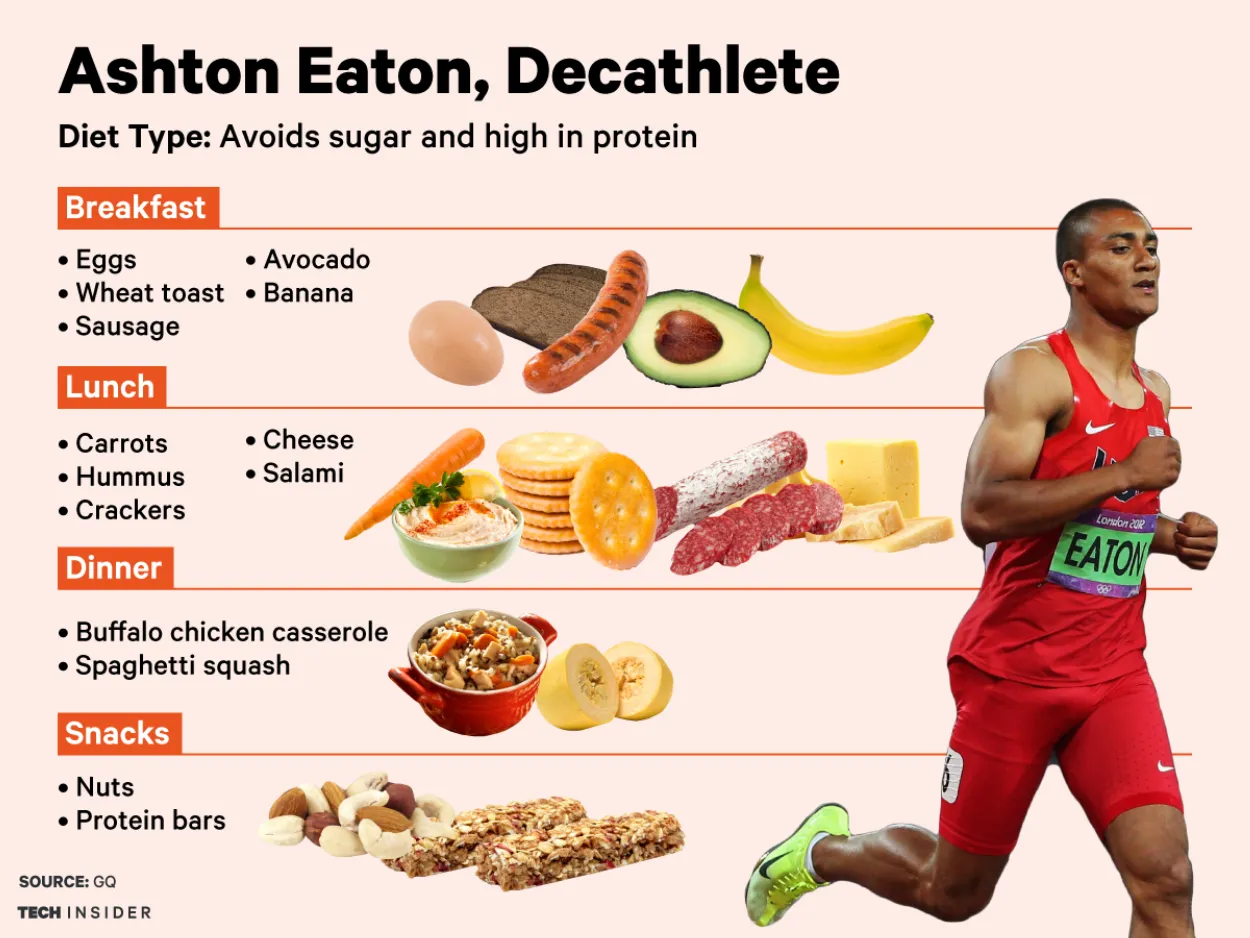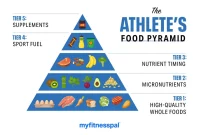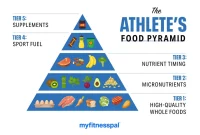Fueling Champions: What Top Athletes Eat
Diet Plans of Famous Athletes
Achieving greatness in sports requires not only talent and hard work but also proper nutrition. What top athletes eat plays a crucial role in fueling their bodies for optimal performance. Let’s take a glimpse into the diet plans of some famous athletes:
1. Cristiano Ronaldo
One of the world’s most renowned soccer players, Cristiano Ronaldo follows a strict diet to maintain his peak physical condition. He focuses on consuming lean proteins like chicken and fish, along with whole grains, fruits, and vegetables. Ronaldo also avoids alcohol and sugary drinks.
2. Serena Williams
Being a dominant force in tennis, Serena Williams pays close attention to her nutrition. She emphasizes a plant-based diet with lots of vegetables, fruits, and whole grains. Williams also incorporates lean proteins such as chicken and fish, complemented with healthy fats like avocado and nuts.
3. Usain Bolt
The fastest man on earth, Usain Bolt, relies on a diet rich in lean proteins like chicken and fish. He includes plenty of fresh fruits and vegetables for essential vitamins and minerals. Bolt also consumes complex carbohydrates such as yams and pasta to provide the energy needed for his explosive sprints.
4. Michael Phelps
Olympic swimmer Michael Phelps is known for his incredible 12,000-calorie diet during competitions. His meals consist of nutrient-dense foods like lean meats, whole grains, and vegetables. Phelps also emphasizes the importance of staying hydrated by consuming large amounts of water.
5. Simone Biles
Simone Biles, an outstanding gymnast, follows a balanced diet to support her rigorous training. She focuses on consuming lean proteins, whole grains, and plenty of fruits and vegetables. Biles also includes dairy products in her diet for calcium and vitamin D.
While the specific diet plans may vary, it is evident that top athletes prioritize a combination of lean proteins, whole grains, fruits, and vegetables. They aim to maintain a well-balanced diet to optimize their overall performance.
The Science of Sports Nutrition
In the competitive world of sports, nutrition plays a crucial role in athletes’ performance and success. Understanding the science behind sports nutrition is essential for top athletes to fuel their bodies effectively and optimize their performance.
A balanced diet is key for athletes to meet their energy demands and maintain optimal health. Carbohydrates, proteins, and fats are the three macronutrients that provide energy and support various bodily functions. Athletes require a higher intake of these macronutrients due to their increased energy expenditure.
Carbohydrates are the main source of energy for athletes. They provide the necessary fuel for intense physical activity. Complex carbohydrates such as whole grains, fruits, and vegetables are preferred over simple sugars as they release energy slowly and sustainably.
Proteins are essential for muscle tissue repair and growth. Athletes need an adequate amount of protein to support their active lifestyle. Good sources of protein include lean meats, poultry, fish, dairy products, legumes, and plant-based proteins.
Fats, particularly healthy fats like avocados, nuts, and olive oil, are important for maintaining overall health, providing energy, and aiding in the absorption of fat-soluble vitamins. Athletes should focus on consuming unsaturated fats while limiting saturated and trans fats.
Hydration is another crucial aspect of sports nutrition. Adequate fluid intake before, during, and after exercise helps maintain body temperature, aids in digestion, and prevents dehydration. Water is generally sufficient for most athletes, but for endurance activities or prolonged exercise, sports drinks containing electrolytes may be necessary.
In addition to macronutrients and hydration, athletes also require an appropriate intake of vitamins and minerals. These micronutrients play a vital role in various bodily functions, including energy production, muscle contractions, and immune system health. A well-balanced diet that includes a variety of fruits, vegetables, and whole foods generally provides the necessary micronutrients.
In conclusion, the science of sports nutrition revolves around providing the right balance of macronutrients, fluids, and micronutrients to support athletes’ performance and overall well-being. By understanding their nutritional needs and making informed choices, top athletes can fuel their bodies effectively and achieve peak performance.
Balancing Carbs
Carbohydrates play a crucial role in the diet of top athletes. They are the primary source of energy and fuel their athletic performance. However, finding the right balance of carbs is essential to optimize their performance, endurance, and recovery.
Complex carbohydrates, such as whole grains, fruits, and vegetables, provide a sustained release of energy, while simple carbohydrates, such as sugary snacks and drinks, offer a quick burst. Athletes must focus on consuming complex carbs as a consistent energy source throughout the day.
The timing of carbohydrate consumption is equally important. For energy during workouts, athletes should fuel up on carbs 1-3 hours before exercise. This can include foods like oatmeal, bananas, or whole grain toast. After training, they should replenish their glycogen stores with a mix of complex carbs and lean proteins.
It’s also vital for athletes to listen to their bodies and adjust their carbohydrate intake accordingly. Every athlete’s needs may vary depending on their sport, training intensity, and body type. Consulting with a sports nutritionist can be beneficial to create a personalized carbohydrate plan.
Remember, carbohydrates are not the enemy but rather a critical ally for top athletes. With proper balancing and timing, carbs can help fuel champions and elevate their performance to new heights.
Proteins
As athletes strive to reach the top of their game, their diet plays a crucial role in providing the necessary fuel for optimal performance. One essential component of their dietary regimen is proteins.
Proteins are the building blocks of muscle tissue and are responsible for repair and growth. They also play a crucial role in supporting a healthy immune system and aiding in the recovery process after intense physical activity.
Athletes often opt for lean sources of protein such as chicken, turkey, fish, and lean cuts of beef. These protein sources are not only rich in essential amino acids but also low in saturated fats, making them an ideal choice for maintaining a healthy body composition.
Plant-based protein sources like tofu, tempeh, quinoa, lentils, and beans are also popular among athletes, particularly those following a vegetarian or vegan diet. These options not only provide a good amount of protein but also offer other beneficial nutrients and fibers.
It’s important for athletes to consume an adequate amount of protein throughout the day, especially after workouts. This aids in muscle recovery and helps prevent muscle breakdown. Including protein-rich snacks like Greek yogurt, protein bars, or a whey protein shake can be beneficial in meeting their daily protein needs.
While proteins are undoubtedly essential for athletes, it’s crucial to strike a balance and not solely rely on them for fuel. A well-rounded diet that includes carbohydrates, healthy fats, and plenty of fruits and vegetables is equally important for overall health and performance.
Fueling Champions: What Top Athletes Eat
When it comes to achieving peak performance, proper nutrition plays a crucial role for top athletes. They understand that what they eat directly impacts their energy levels, recovery, and overall performance. To stay at the top of their game, here are some key components of their diet:
1. Macronutrients
Top athletes carefully balance their intake of carbohydrates, proteins, and fats. Carbohydrates provide the necessary fuel for intense workouts and competitions, while proteins support muscle repair and growth. Healthy fats are essential for hormone production and nutrient absorption.
2. Whole Foods
Highly processed foods have no place in the diets of top athletes. Instead, they focus on consuming whole, nutrient-dense foods such as fruits, vegetables, whole grains, lean meats, and plant-based proteins. These foods provide a wide range of vitamins, minerals, and antioxidants.
3. Hydration
Staying hydrated is vital for athletic performance. Top athletes prioritize water intake before, during, and after training sessions to maintain optimal fluid balance. They also replace electrolytes lost through sweat with sports drinks or natural electrolyte-rich foods.
4. Snacking Strategically
Smart snacking is an integral part of an athlete’s diet. They choose balanced snacks that provide a combination of carbohydrates, proteins, and healthy fats to fuel their workouts and aid in recovery. Examples include Greek yogurt, nuts, seeds, and smoothies.
5. Timing and Quantity
Timing meals and snacks appropriately is crucial. Athletes consume a pre-workout meal to fuel their bodies, a post-workout meal to aid in recovery, and regular meals throughout the day to maintain energy levels. Portion control is also important to avoid any discomfort during physical activity.
6. Individualized Approach
Lastly, it’s important to note that the dietary needs of athletes may vary depending on their sport, goals, and individual characteristics. Working with a registered dietitian or nutritionist can help athletes develop personalized meal plans that cater to their specific requirements.
Eating for Endurance vs Strength
When it comes to fueling their bodies for peak performance, top athletes understand the importance of eating the right foods. However, the dietary needs of athletes can vary depending on whether they are aiming for endurance or strength. Let’s explore the differences between these two approaches to fueling champions.
Endurance Athletes:
For endurance athletes, such as marathon runners or cyclists, energy is a top priority. Their bodies need a steady supply of fuel that can be sustained over a long period of time. To achieve this, endurance athletes focus on consuming complex carbohydrates, which provide a slow release of energy. Foods like whole grains, brown rice, and sweet potatoes are excellent choices. Additionally, these athletes need a moderate amount of lean protein to aid in muscle repair and recovery.
Strength Athletes:
On the other hand, strength athletes, like powerlifters or bodybuilders, require a different approach to their diet. Their main goal is to build and maintain muscle mass. To accomplish this, strength athletes prioritize a high intake of protein. They rely on sources such as lean meats, fish, eggs, and plant-based proteins like tofu or lentils. Alongside protein, they also consume complex carbohydrates to support their intense workouts.
Similarities:
While there are differences in the dietary strategies of endurance and strength athletes, there are also some commonalities. Both types of athletes benefit from consuming a variety of fruits and vegetables, which provide essential vitamins, minerals, and antioxidants. Hydration is crucial for both endurance and strength athletes, so regular water intake is equally important.
Understanding the distinct nutritional needs of athletes depending on their focus is essential for optimizing performance. Whether an athlete’s goal is endurance or strength, their diet is a critical component that can make all the difference in achieving their fullest potential.
The Myth of Superfoods in Sports
When it comes to sports, there is often a fascination with what top athletes eat and drink. Many people believe in the power of so-called “superfoods” to enhance athletic performance. However, the idea that specific foods can turn an average athlete into a champion is mostly a myth.
While it is true that proper nutrition plays a crucial role in athletic success, there is no single food or group of foods that can guarantee superior performance. Athletes require a well-rounded diet that includes a balance of macronutrients such as carbohydrates, proteins, and fats, as well as an array of vitamins and minerals.
In reality, the concept of superfoods is more of a marketing ploy than anything else. Food companies and the media often hype up certain foods as being “super” based on their supposed high nutrient content or unique health benefits. However, these claims are typically exaggerated or not supported by scientific evidence.
Instead of focusing on specific superfoods, athletes should prioritize overall dietary quality and variety. A diet rich in fruits, vegetables, whole grains, lean proteins, and healthy fats will provide the necessary nutrients for optimum performance and recovery.
Furthermore, individual differences in genetics, training programs, and other factors should not be overlooked. What works for one athlete may not work for another. Personalized nutrition plans tailored to an athlete’s specific needs and goals are more effective than simply relying on trendy superfoods.
In conclusion, the belief in superfoods as a key factor in athletic success is largely a misconception. While it is important to eat a nutritious diet, there is no magic food that can instantly transform an athlete into a champion. The focus should be on overall dietary quality, individual needs, and evidence-based nutrition strategies.
Conclusion
Top athletes understand the importance of proper nutrition in fueling their performance. They prioritize consuming a balanced diet that includes lean proteins, complex carbohydrates, healthy fats, and plenty of fruits and vegetables. By fueling their bodies with the right nutrients, athletes can optimize their energy levels, enhance their endurance, and support their overall health and well-being.




